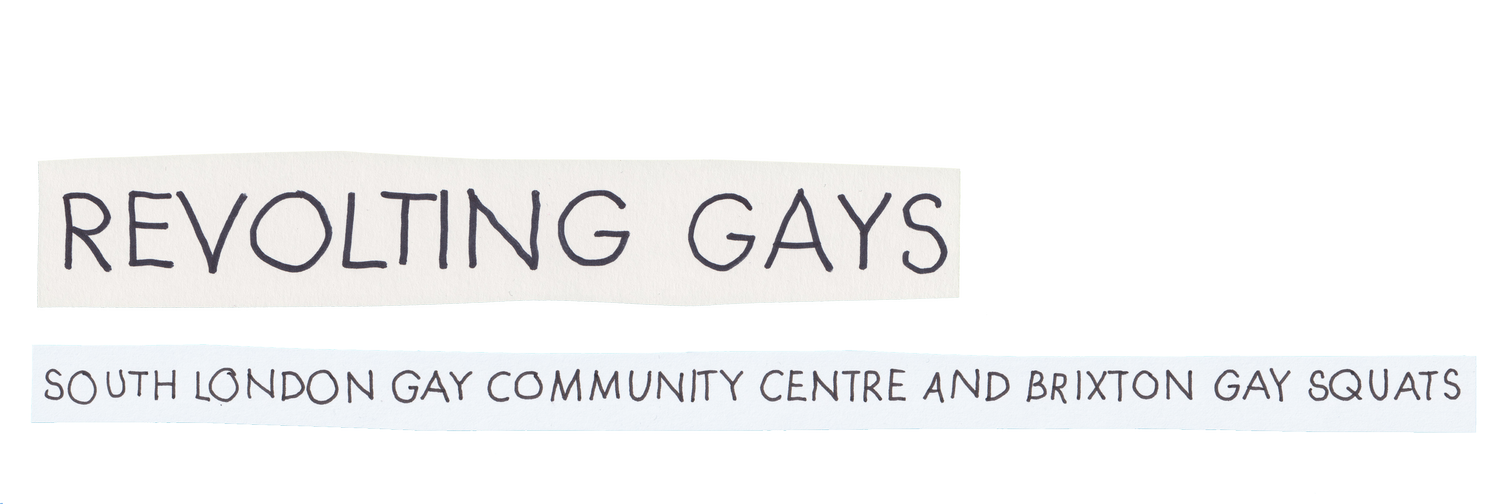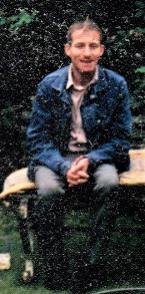Derek Brand
Derek Brand's account of his involvement in the Gay Centre - November 2020
Derek Brand first went to the South London Gay Community Centre in March 1974 shortly after it had first been squatted. He discovered the centre existence after seeing an article about its opening in Gay News. He was attracted to the possibility of meeting other gay people in a relaxed and informal seating. This was especially important given that as a seventeen year old he was underage and prevented from going to pubs and clubs.
He was quick to make many friends at the centre including Bill Thornycroft, Ian Townson, Tony Smith, Malcolm Greatbanks, Gary de Vere, Colm Clifford, Alistair Kerr, David Callow, John, Linda and many others. It was here that he met Tom, a fellow Scot, who later became his first partner.
Derek stayed at a squat/commune when he first came to London but he felt that he could not trust some of the people there with instances of homophobia so he went off squatting elsewhere. Bill Thornycroft helped him out a great deal by letting him stay at his house when he was stuck for a place to live.
Prior to squatting the gay centre the South London Gay Liberation Front had social gatherings after meetings at the Paulet Arms, the Hanover Arms and the Crypt of St. Matthews Church in Brixton. After this a weekly disco was established at the Gay Centre with disco queens paying a small fee and bringing their own booze.
It wasn't long before Derek pitched in to help at the Gay Centre. He ran the weekly disco for eighteen months made possible by the donation of a record deck, microphone and "lots of lovely records" moving from the ground floor to the basement providing more space for dancing and socialising:
"The disco equipment at that time was quite basic consisting of a twin record deck and a separate audio tape player/recorder linked to an amplifier and speaker. Operating meant alternating between the deck playing a record and when that finished, switching to a pre-recorded track on the tape recorder"
Despite the 'primitive' nature of the disco equipment compared to the present era of CDs, MP3 players and computer generated sound systems Derek ran a professional and efficient set up and the discos were well-attended and very successful. The disco was later taken over and run by Tony Reynolds.
Derek managed to squeeze a small allowance from the Gay Centre budget to buy new records and was diligent in contacting record companies to supply promotional copies to add to the selection already donated. The music was mainly 'pop' but also ranged across soul, funk, reggae and disco which was just beginning to come to the fore at that time. However not all was plain sailing:
"I remember there was a break in at the Centre and some records were taken. I contacted Gay News who printed an article about this. A particular record that I played at that time, “Fattie Bum Bum” by Carl Malcolm (1975), caused a stir as it was deemed to be offensive to women."
The record in question was ordered to be destroyed because it made fun of and ridiculed a woman who was deemed to be sexually unattractive because of her size. This was a radical misinterpretation of the song's contents by the 'furious' gay liberationists because the singer was in fact praising the charms and attractions of a woman with the fuller figure.
When Derek first came became involved with the Gay Centre as a seventeen year old he had very little experience of gay liberation politics:
"I did see Pearl who ran the shebeen but was wary of going there. I only learnt more about gay politics as I went along being satisfied with the social thing and the disco. I was only about seventeen and very green! In visiting the Centre for a length of time I became more acquainted with gay (and Lesbian) rights through South London GLF and was also discovering the gay squatting commune, a claimants’ union and a gay helpline - Icebreakers. Not to forget there were also the Gay Pride marches, plays at the Oval House and 'zaps'. I also remember one of Alistair Kerr’s choice words when challenging heterosexuality, 'breeders'.”.
He has clear memories of the Gay Centre being evicted and its short life after being re-squatted in the 'late seventies' and still keeps in touch with friends and acquaintances he met there:
"I have seen one or two people at events, John Lloyd, Tony Smith, and Ian Townson. There was the Railton Road history walk (Queer Walking Tour of Brixton), a talk at the Cinema Museum (run by a gay men, Ron Grant and Martin Humphries) and other events."
And Derek's final word:
"I think that without the Gay Centre I would have been lost. It was my entry into the wider gay world."

